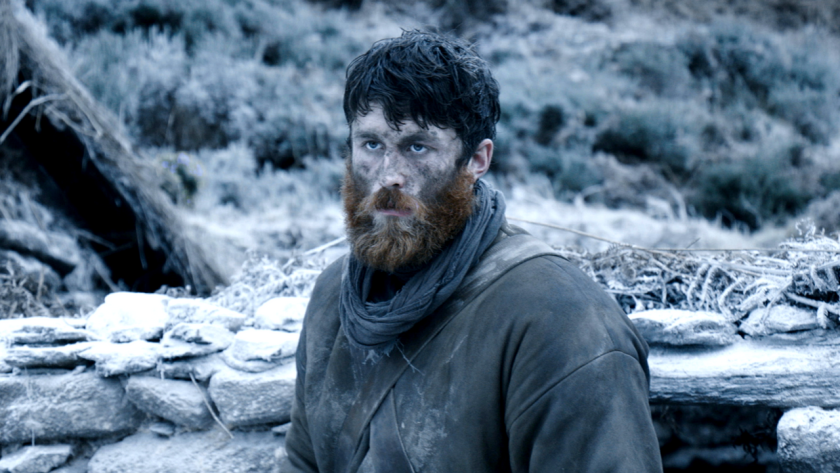Even for those with only a passing acquaintance with Irish history, the Famine – or the Great Hunger – looms large, when British indifference to the failed potato crop in large parts of Ireland resulted in the deaths or emigration of nearly a quarter of the country’s population in the 1840s and 1850s. The wholly avoidable tragedy (Ireland exported huge amounts of grain, butter and livestock during the famine) resides still in the modern Irish psyche; it is no coincidence that of all the nations that contributed to Live Aid in 1985, Ireland’s contribution, per capita, was the greatest.
Lance Daly’s riveting film is set in 1847, at the height of the famine, when the potato blight turned the fields black. Martin Feeney (played with stoic menace by Australian actor James Frecheville), a deserter from the British Army, returns home to the west of Ireland after many years away to find his mother starved to death and his brother hanged for stabbing a bailiff who came to “tumble” (remove the thatched roof) their tiny cottage to make it uninhabitable – a common “punishment” for not paying the rent.
But this is no historical drama; the famine merely forms the contextual backdrop as the political is made personal, and it's Feeney’s understandable outrage that drives the narrative. In making, remarkably, the first Irish feature film about the famine, Daly has fashioned one that – with its horses, rifles, few women, and a lone man bent on violently righting wrongs pursued by a lawman with increasingly conflicted emotions and loyalties – has echoes of revenge Westerns of yore.
 The lawman in question is Inspector Hannah (Hugo Weaving, pictured right with Freddie Fox), reprieved from the gallows after killing a suspect in custody to hunt down the man he once served with in the British army, accompanied by Freddie Fox’s priggish Captain Cope and a naive teenage private (Barry Keoghan), who gradually has his eyes opened to the awfulness of Ireland's plight.
The lawman in question is Inspector Hannah (Hugo Weaving, pictured right with Freddie Fox), reprieved from the gallows after killing a suspect in custody to hunt down the man he once served with in the British army, accompanied by Freddie Fox’s priggish Captain Cope and a naive teenage private (Barry Keoghan), who gradually has his eyes opened to the awfulness of Ireland's plight.
One by one, and moving up the social scale from policemen and bailiffs to land agents and the judge who hanged his brother (who insists the Irish-speaking locals speak English in his courtroom where he hands down savage sentences to the hungry and dispossessed), Feeney offs all those who have hurt his family, and the hunting party realise he is intent on reaching the egregious landowner who has left his tenants to die miserable deaths (Jim Broadbent, unusually, in an unsympathetic role).
The lawmen must stop Feeney before he reaches Lord Kilmichael, and along the way pick up Conneely, an Irish translator (Stephen Rea in puckish mood).
There are plenty of shoot-’em-up scenes (thankfully the most graphic violence is off screen) and Feeney shoots himself out of a few holes, but there’s quiet humour too. When Feeney interrupts a gathering where the starving local populace have been lured by a Protestant preacher who makes them renounce their Catholic faith in return for a bowl of soup, one of them hisses at him: “We’ve been listening to this shite for hours. Don’t mess it up for us.”
As you might expect of a film set in the west of Ireland, the scenery is stunning and shown in its full rugged beauty, but with Daly bleaching out scenes of squalor and desperation. The British are, almost without exception, appalling but Daly shows the Irish middlemen who managed the absentee landlords’ estates and those who dispensed its harsh justice in an equally bad light.
Frecheville gives an impressive and memorable performance yet, with Freeney's hellbent pursuit of his victims and Hannah's equally relentless quest to get his man, this is not an emotionally textured film. But Black 47 is a gripping and unusual drama none the less.














